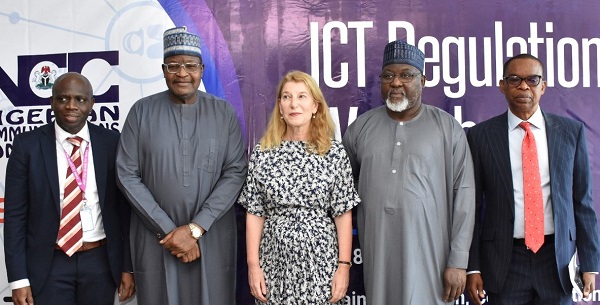
The executive vice chairman (EVC) of the Nigerian Communications Commission (NCC), Prof. Umar Danbatta has expressed his admiration for the Swedish government and Ericsson for their unwavering commitment and consistent collaboration with the NCC in a strategic partnership focused on capacity building.
This enduring partnership has significantly bolstered the commission’s regulatory capabilities.
Danbatta conveyed his appreciation during a workshop jointly organised by the NCC and its Swedish partners under the Swedish Programme for Information and Communications Technology (ICT) in Developing and Emerging Regions (SPIDER). He highlighted the remarkable progress achieved by the NCC in ICT.
He stated, “This workshop underscores the pivotal role played by the Nigerian Communications Commission as a regulator in the West African sub-region. It also underscores our perpetual commitment to staying current with the ever-evolving dynamics of the telecommunications sector”.
The NCC’s chief executive reiterated the steadfast dedication of the Swedish Government and SPIDER to promoting ICT development in emerging regions. He acknowledged their contributions to enhancing access to healthcare, education, income generation and employment opportunities in West Africa, thereby contributing to poverty reduction.
“The ongoing strategic engagement facilitated by SPIDER over the years has transformed the commission into a more effective regulator and amplified its contributions to the telecommunications sector’s development. This contribution will further facilitate the creation of an ecosystem that benefits the economies and people of the region,” affirmed the EVC.
In her address, the Swedish Ambassador to Nigeria, Ghana, Cameroon and the Economic Community of West African States (ECOWAS), Mrs. Annika Hahn underscored the importance of ICT regulation and capacity building as pivotal drivers of economic development and social progress.
The ambassador praised the NCC for hosting the event and fostering collaboration between the two nations. She acknowledged the role of ICT in Sweden’s economic growth, emphasising that Sweden, as the birthplace of Ericsson, one of the world’s oldest and largest ICT companies, has a rich history in the sector.
Hahn also highlighted the global technological revolution and its potential to catalyse industrial and economic development. She emphasised the need for modern and adaptable regulations to navigate this rapidly evolving landscape.
The diplomat noted that the COVID-19 pandemic accelerated the adoption of ICT worldwide, resulting in an increase in Internet users. This shift had a profound impact on various sectors, including education, commerce, and financial services, with e-learning playing a significant role in the transformation.
Furthermore, Hahn cited data from Ericsson, reporting more than 900 million registered mobile subscriptions in Sub-Saharan Africa in 2022, with a substantial portion in Nigeria. She emphasised that education must be a fundamental component of regulatory development strategies and policies, a statement by the commission’s director of public affairs, Reuben Muoka, added. Collaboration in knowledge-sharing and the upskilling of human resources is crucial for all stakeholders to drive growth and contribute to the ambitious goal of exceeding one billion mobile subscriptions by the end of 2023 in Sub-Saharan Africa.
The enduring partnership between the Swedish government, Ericsson and the NCC serves as a testament to the profound impact that collaboration and capacity-building can have on the telecommunications sector and the broader economy.


